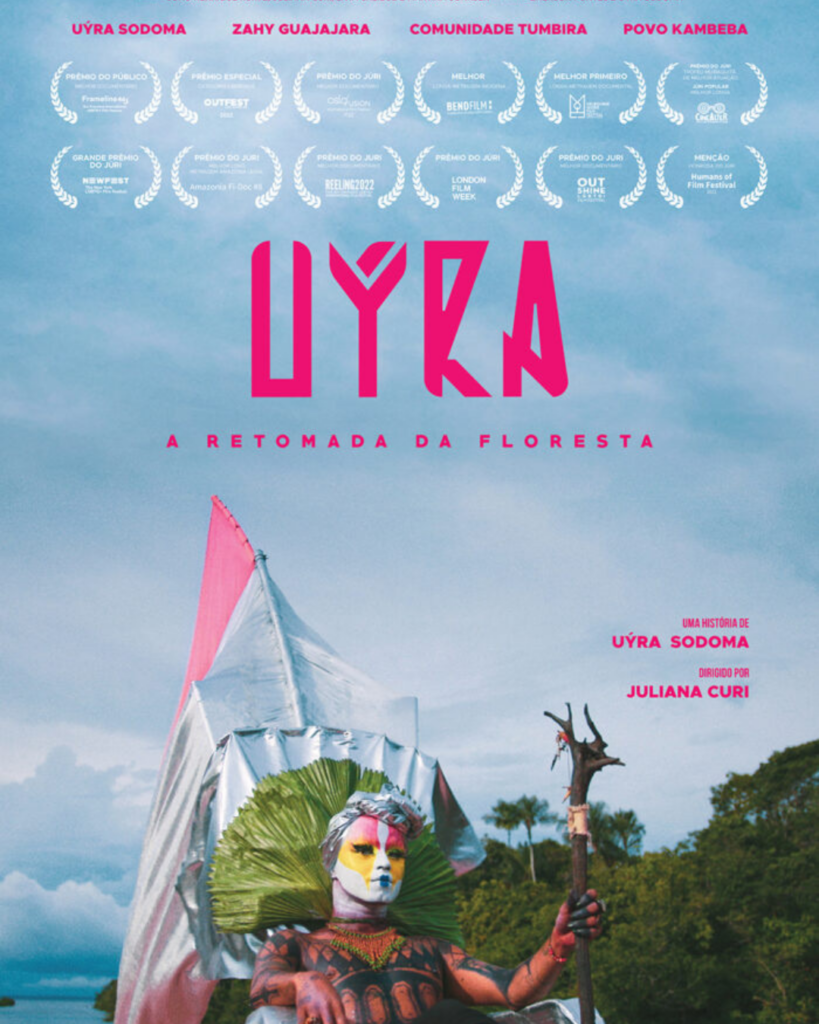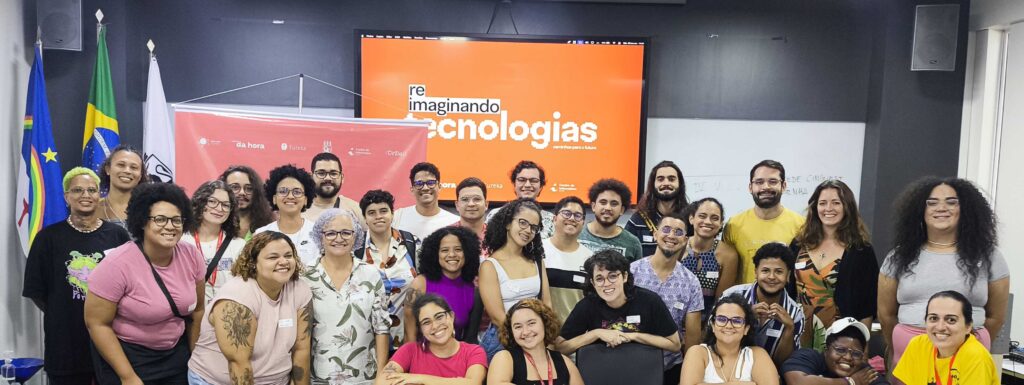From December 16th, 2024 to March 30th, 2025, DPA, Instituto Da Hora and Eureka hosted the Book and Movie Club “(Re)Imagining Technologies: Pathways to the Future.” This free, public initiative brought together over 250 Portuguese-speaking participants from across Brazil.
Below are some highlights from the Book and Movie Club.
Theme of the Club
This Book and Movie Club focused on (re)imagining futures and technologies through science fiction beyond the Global North. It formed part of a collaborative initiative between DPA, Eureka, and Instituto da Hora. Participants were invited to critically and creatively engage with sci-fi works produced outside dominant Western narratives, reflecting on the political, social, and technological questions these stories raise.
The Club fostered a deeper understanding of how technology and futurism are lived, challenged, and reimagined in diverse cultural and geopolitical contexts. Discussions explored themes such as surveillance, the climate crisis, labor, and post-colonial resistance.
Participants were encouraged to question which futures are centered in mainstream science fiction and to envision alternative trajectories grounded in collective agency, care, and justice. In doing so, the Club created space for reflection on the power of storytelling to shape not only technology, but also policy, and society—promoting speculative practices that disrupt exclusionary models of progress.
Featured Books and Movies



In the first two months of the Book and Movie Club, the theme of dystopias in science fiction provided a starting point for reflecting on technology as a tool of oppression, surveillance, and exploitation. Through speculative narratives grounded in diverse cultural and political contexts, participants were encouraged to critically examine how technological systems can reinforce power imbalances and enable social control.
Little Eyes, written by Argentine author Samanta Schweblin, was the book selected for this purpose. The novel describes a world where small animal-shaped robots called Kentukis become embedded in everyday life, allowing anonymous individuals to observe—and sometimes manipulate—the lives of others. What initially appears as a tool for connection quickly reveals itself as a possible mechanism of surveillance, raising questions about intimacy, control, and the commodification of privacy.
The selected movie for the first month was Sleep Dealer, directed by Alex Rivera. Set in a militarized future where borders are closed but labor flows freely through digital networks, the story follows a young Mexican man who connects his body to a global system of remote-controlled labor. This movie explores issues of migration, bodily autonomy, and the neoliberal outsourcing of labor, making visible the often-invisible structures that exploit workers in the name of technological progress.
The movie chosen for the second month, They Cloned Tyrone, directed by Juel Taylor, blends science fiction with satire and social commentary. The story unravels a government conspiracy involving genetic experimentation and mind control targeting Black communities. The movie critiques systemic racism, surveillance, and the commodification of Black bodies, offering a powerful reflection on how history and technology intersect in the reproduction of inequality.


In the final two months, the Club shifted its focus from dystopias to utopias in science fiction, exploring how imagined futures can inspire new ways of living, relating, and rethinking the transformative potential of technology. Instead of emphasizing control and exploitation, these works encouraged participants to reflect on resilience, identity, and alternative pathways toward more just and inclusive futures.
The selected book was Binti, written by Nnedi Okorafor, a Nigerian-American author. The story follows a young Himba girl who becomes the first of her people to be accepted into a prestigious intergalactic university. Binti challenges dominant narratives of science, belonging, and progress, proposing a vision of the future grounded in cultural heritage, knowledge exchange, and healing.
The movie chosen for the third month was Belle, directed by Japanese filmmaker Mamoru Hosoda. This animated film reimagines the classic tale of Beauty and the Beast in a near-future digital world where individuals can create alternate versions of themselves through a vast online platform. Through the journey of Suzu—a shy teenager who finds empowerment and voice in her digital avatar, Belle—the film explores themes of grief, connection, anonymity, and self-expression in virtual spaces, while questioning the boundaries between reality and technology.


Over the last month, two movies guided the Club’s reflections with the intent of exploring alternative understandings of technology—not just as machinery or digital tools, but as systems of knowledge, creativity, and connection, emphasizing how nature, art, and ancestral wisdom can coexist with and even shape technological futures that are more just, inclusive, and sustainable.
Pumzi, directed by Kenyan filmmaker Wanuri Kahiu, is a short film set in a post-apocalyptic world where ecological collapse and extreme water scarcity have forced humanity into highly regulated underground settlements. The narrative follows a young scientist who dares to imagine and pursue life beyond the confines of her society, challenging both environmental despair and authoritarian control with imagination and hope.
Uýra: The Rising Forest, a Brazilian documentary directed by Juliana Curi, documents the journey of Uýra Sodoma, a non-binary Indigenous artist and biologist, as they travel through the Amazon rainforest using performance art to raise awareness, affirm Indigenous identities, and empower LGBTQIA+ youth. Blending ecology, art, and resistance, the film offers a powerful meditation on the relationship between body, territory, and transformation.
Conversation Circles and Screening Events
A key component of the Club were the “Conversation Circles”—dedicated gatherings where participants came together to share reflections, insights, and questions about the book and/or movie of the month. These spaces fostered collective dialogue and critical thinking, deepening engagement with the selected works and allowing diverse perspectives to emerge. Over the course of the Club, we hosted three Conversation Circles: two virtual and one hybrid, ensuring accessibility across different locations and contexts.
The Conversation Circles also offered space for meaningful exchange with guest speakers and specialists, enriching discussions with a range of perspectives. Dialogue was shaped and deepened by contributions from participants and invited experts, including Nina da Hora, founder and director of Instituto da Hora, whose work centers on racial justice, technology, and ethics in science. Members of the Data-Pop Alliance team also contributed, including Julie Ricard, former Director of the Technology and Democracy Program at DPA, who shared reflections on digital rights, feminist technologies, and the intersection of storytelling and social justice.
To further promote inclusion and equal access, we organized virtual screenings of all selected films. These sessions ensured that all participants could engage with the visual narratives, regardless of individual access to streaming platforms—reinforcing the Club’s commitment to an inclusive and welcoming learning environment.
Hybrid Event in Recife

Another key component of the Club was our hybrid meeting held in Recife (Pernambuco, Brazil) and online on March 29th. This 4-hour, in-person gathering brought participants together for a shared experience of the month’s selected films—Pumzi and Uýra: The Rising Forest—through a collective screening that laid the foundation for deeper reflection.
Following the screening, a round-table discussion was held with invited guests: Luana Maria, founder and CEO of Pajubá Tech; George Valença, Associate Professor at UFRPE; and Carla Silva, professor at CIn – UFPE and Coordinator of the Grupo Cíntia. The event concluded with an in-person Conversation Circle, where participants engaged directly with the speakers and with Nina da Hora.
This gathering marked a powerful moment of connection, anchoring the Club’s reflections in a shared physical space and reinforcing the value of collective dialogue. By bringing together community members, activists, scholars, and artists as participants, the meeting highlighted the strength of intersectional perspectives and the importance of grounding technological conversations in local realities. This closing event encapsulated the spirit of the Book and Movie Club, creating spaces where stories spark transformation, and where imagining different futures becomes a collaborative and empowering act.
Future Events
If this discussion sparked your interest, follow us on social media for updates on future events and book clubs. If you are interested in organizing a Book and Movie Club using the Eureka platform, please let us know here.


![M002 - Feature Blog Post [WEB]](https://datapopalliance.org/wp-content/uploads/2025/10/M002-Feature-Blog-Post-WEB.png)





